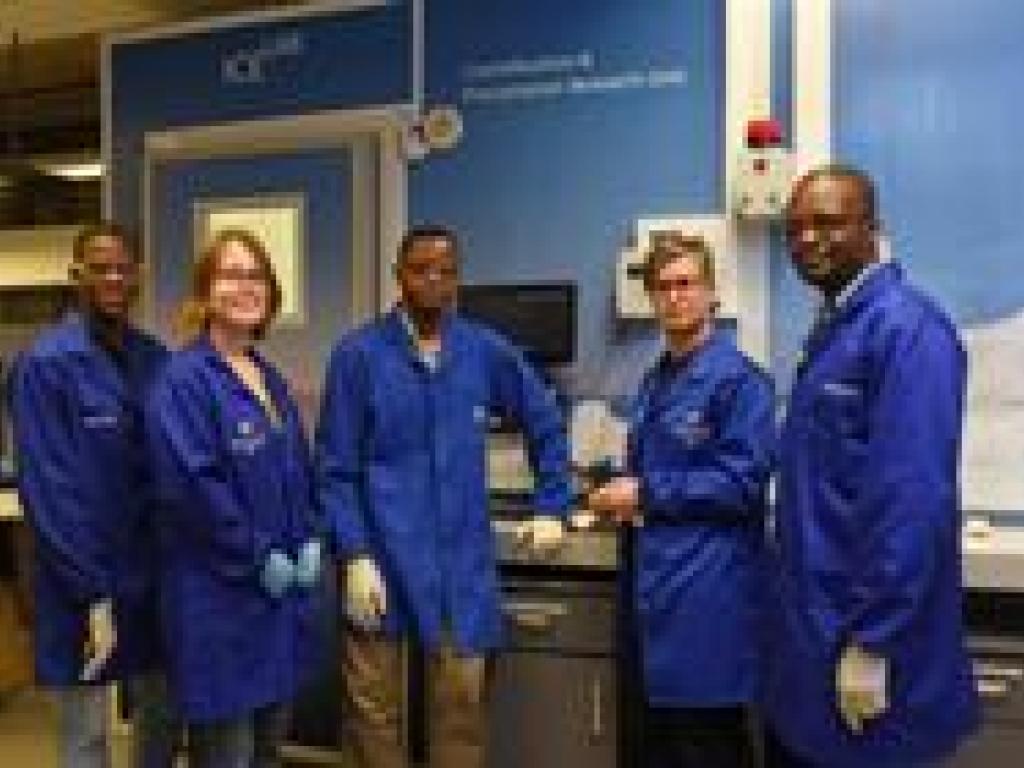Water high on EBE’s agenda

Left to right: Senzo Mgabhi, Debbie Jooste, Jemitias Chivavava, Prof Alison Lewis and Cledwyn Mangunda
Engineering & the Built Environment Dean Professor Alison Lewis and her team recently brought home an award from the Water Research Commission for a pioneering process to treat acid mine drainage – but this is only a hint of things to in the year ahead when water will play an even greater role in the life of the faculty.
Professor Alison Lewis has had water on her agenda ever since she did her masters on the mathematical modeling of a biological wastewater treatment system.
When it came to a PhD, she was offered a bursary at Wits to study the way in which fires travel through mines.
But, it was to water she returned when her mentor Gerhard Marais, a former water-engineering professor at UCT, told her: “There’s only one thing to do a PhD on, and that is water.”
“He actually ran a course called ‘low-cost sanitation’ which was all about how to design pit latrines and the like. I thought the course was just going to be hell – but I think it was the best course I ever did,” says Lewis from the dean’s office in the New Engineering Building.
When it came to setting up a research group, Lewis was advised she would only get funding for work on precious metals. Nevertheless, her interest in water kept ticking over in the background, and in recent years more and more water research funding has become available.
No wonder then, that Lewis is excited that EBE has been given the thumb’s up to host an inter-disciplinary Future Water Institute set to launch in 2016. The trans-disciplinary institute will focus on water security and solutions to the water crisis across the faculties.
Turning waste into value
One such solution is the work for which Lewis and her team recently won a special Knowledge Tree Award from the Water Research Commission for “new products and services for economic development”.
Using a technique called eutectic freeze crystallization, Lewis’s team has pioneered a way of turning contaminated mine water back into clean potable water and individual salts.
Described as a kind of modern-day ‘alchemy’, this involves freezing out fresh water from the hyper-saline brine which makes up acid mine drainage before separating out the individual salts by freezing them at individual (eutectic) temperatures.
The outcome is water clean enough to return to the environment, and salts (the likes of gypsum used in building or sodium sulphate used in soaps, detergents and glassmaking) that can be recycled.
Explains Lewis: “Acid mine drainage is talked about as toxic waste but it’s 98% water. The contaminants are miniscule. At the end of the day it’s about turning waste into value.”
The process has now advanced to the point where it is being commercialised – with a pilot plant at the Coaltech’s Optimum Colliery near Middelburg in Mpumalanga and another in the pipeline for Eskom. There is also a demonstration device on campus.
“It’s also about a mindset change,” says Lewis. “Yes there is a water crisis and, yes, the next war will be fought about water. Water/energy/food – that is the critical nexus. But we have the solutions in our hands…”
With a new Future Water Institute on the cards, watch this space.
*Listen to Lewis participating in a BBC World Service’s Forum programme called Modern Alchemy.
